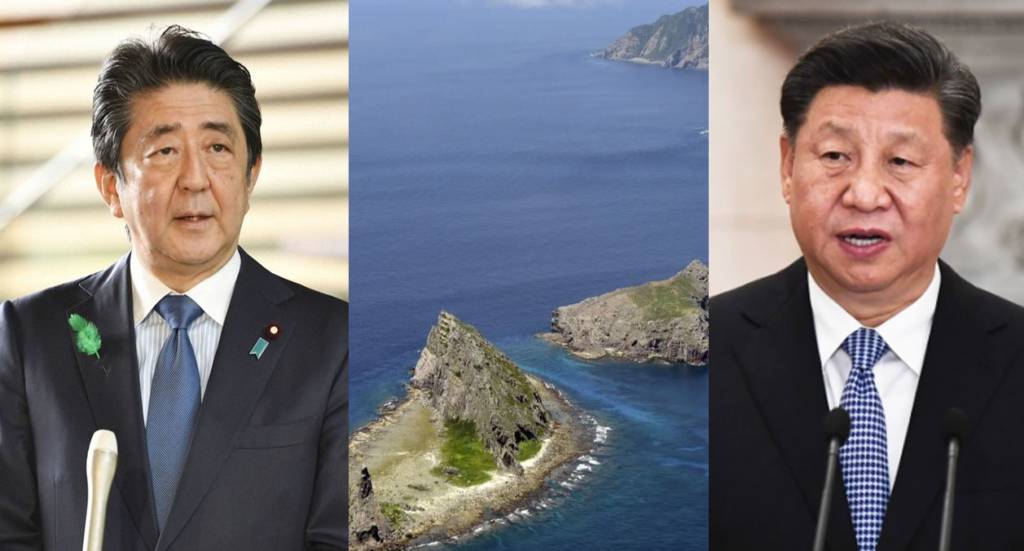Over the past one month, Beijing has been trying to use the COVID-19 Pandemic for pushing its illegitimate, expansionist interests in the South China Sea, and there has been a marked rise in its belligerence against other stakeholders in the strategic waterways- the Philippines, Vietnam, and Malaysia.
But while the South China Sea is in news over Beijing’s belligerence and face-offs with other stakeholders, the Chinese Coast Guard has also been intruding into disputed East China Sea waters as well, leading to a spike in the number of face-offs between Japan and China.
The latest incident happened on Saturday when four Chinese Coastguard vessels entered Japanese waters and started chasing Japanese boats. However, Japan would take none of this, and warded off the Chinese with a warning. This happened close to the uninhabited Diaoyu Islands that were bought by the Japanese government from a private owner in 2012, but expansionist Beijing also claims them.
The Chinese vessels entered the waters close to the Diaoyu Islands at around 4 PM and matters started to escalate 50 minutes later when two Chinese vessels started chasing a Japanese fishing boat in the Japanese waters contested by China.
According to Jiji Press, a Japanese news agency, the Coastguard’s regional headquarters said that the Chinese vessels chased the Japanese fishing boat for about 12 kilometres southwest of Uotsuri, one of the largest islands in the group.
The Japanese maritime agency sent a patrol ship to the scene of Chinese belligerence and issued a radio warning, following which the Chinese Coastguard ships left the area. Three crew members onboard the fishing vessel escaped unhurt.
In fact, the Chinese Coastguard is looking to step up activity in the East China Sea along the contested waters with Japan. On Friday, the Chinese Coastguard stated that its vessels had “patrolled the territorial waters around the Diaoyu Islands”.
The uninhabited islands and reefs located in the East China Sea are rich in resources, a reason why Tokyo and Beijing share decades-old territorial disputes in the maritime region. Beijing’s expansionist ambitions in the East China Sea are about just as objectionable as its ambitions in the South China Sea, even though it is usually the latter which makes it to news headlines.
Ever since the Pandemic took a grip of the world, the Dragon has been trying to tighten its grip on the disputed waters through sheer belligerence and intrusion into the Exclusive Economic Zones (EEZs) and territorial waters of other countries, apart from trying to take administrative control of disputed geographical features.
Last month, Chinese naval warships recently sailed through the Miyako Strait that lies between the Japanese islands of Miyako and Okinawa. Later, the Japanese Foreign Minister Toshimitsu Motegi had also lodged a protest against China for sending its naval assets into Japanese waters near the Senkaku Islands.
China is trying hard to assert its sovereignty in the East China Sea by imposing an annual fishing ban in the maritime region, including in the waters off the coast of Japanese-controlled Diaoyu Islands contested by China.
China is following similar tactics in both the South China Sea and East China Sea. In fact, it also imposed a similar fishing ban in the South China Sea barring other stakeholders like Vietnam and the Philippines from fishing in the disputed waters claimed by Beijing.
The unilateral fishing ban can leave other countries that are dependent on fisheries from the maritime region starving for food amidst the Coronavirus Pandemic, which has led to fishing groups in Vietnam and the Philippines to resist Beijing’s unilateral ban. These countries are traditionally dependent on fishing as a means of survival, and a unilateral ban by Beijing is bound to slip them into crippling food shortages.
Thus, while the South China Sea has come under the spotlight of observers around the world due to a steep rise in Chinese belligerence, Beijing is also trying to flex its muscles in the East China Sea making moves that are bound to provoke Japan, time and again.
